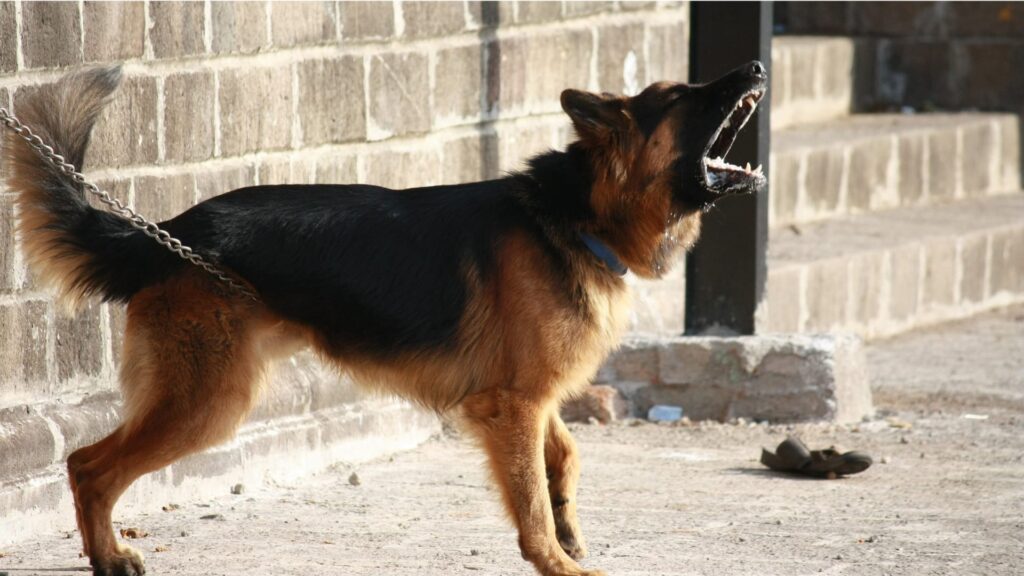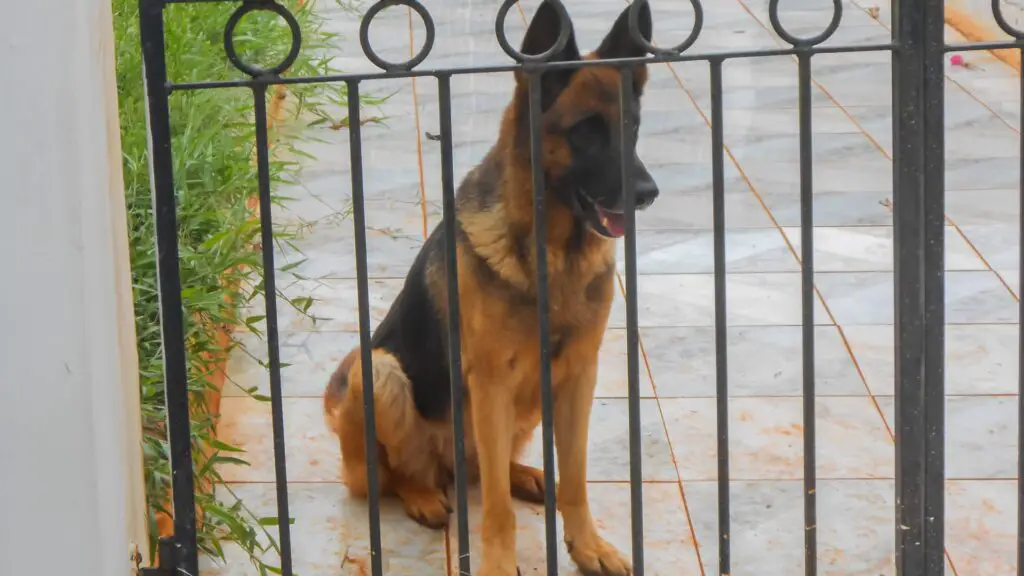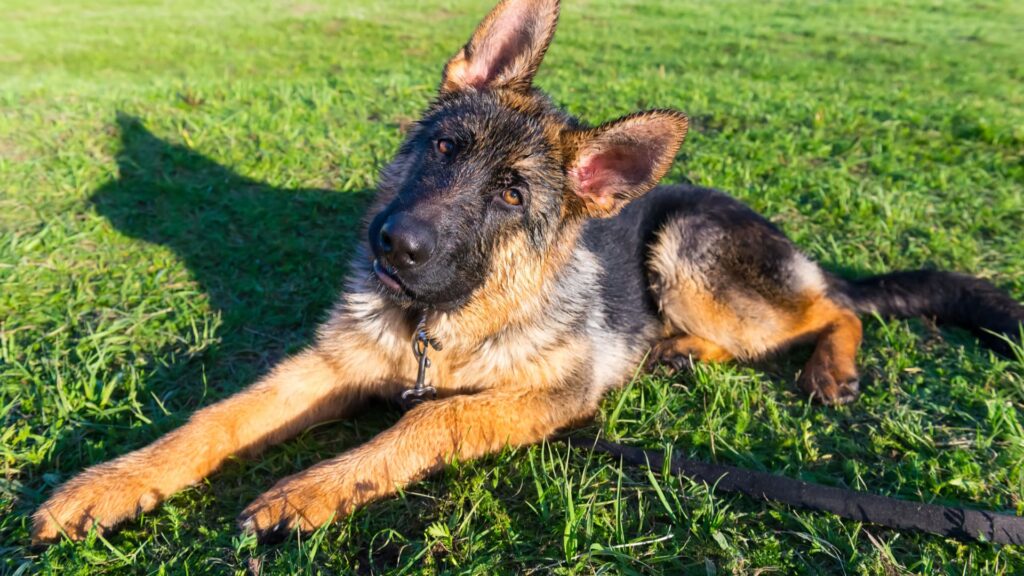How many times have we seen cute videos and pictures of dogs and cats getting along on Instagram?
The answer is way too many.
I recently came across an image of a gigantic dog sleeping and a cute teeny tiny kitten snuggled up next to the dog’s face.
Never believe everything you see on social media, that’s my sincere advice!
Are German Shepherds Good with Cats?

If you are one of the few people who like cats and dogs alike, there are ways to make your cat and dog get along.
Where there is a will, there is a way!
It is hard to believe, but we can train a German shepherd to live in harmony with cats.
I know from experience that a vicious guard dog like a German shepherd can learn to be with cats without attacking them.
Why a German shepherd won’t get along with cats?
It is simple.
Cats unfamiliar with dogs are usually afraid of them, especially if it’s a big dog like a German shepherd.
German shepherds are usually guard or attack dogs, and it’s in their instinct to pounce. If a cat makes sudden movements or runs away, it is natural that this canine will attack.

Should You Get a German Shepherd if You Have a Cat?
German shepherds are among the most intelligent breeds out there. They are smart, sociable, and extremely active.
Although they are the real brainiacs of the dog world, they can still follow their instincts.
Naturally, dogs and cats do not always get on very well. If you already possess a cat, then it may be difficult to make a dog get along with her well.
That is the case with German shepherds!
If not properly socialized from the very start, those dogs will probably keep chasing after your beloved cat. The whole chasing instinct is even more developed in German shepherds, compared to other breeds because those doggies are typically good work dogs.
Their nature makes them the perfect companion when you have to keep the flock in line or herd, in general.
Their ability to effectively chase after sheep and nip at their ankles can be substituted to your cat in the absence of any sheep nearby. Therefore, in most cases, you may need to pay special notice to their living together from the very start.
However, that doesn’t mean you should deprive yourself of the company of such a lovely and loyal companion.

The intelligent and protective nature of German shepherds makes them easy to train, and you can easily make them get along with your house cat quickly and effortlessly.
All you need to do is have patience and teach them properly following certain advice and tricks.
Also read why your German Shepherd stays in the rain?
How To Introduce a German Shepherd to a Cat?
The energetic and intelligent nature of a German shepherd is not always consistent with the carefree and relaxed nature of a pet cat.
Those two little creatures may be in constant conflict and that could seriously injure one of them or create unnecessary noise at home.
Properly introducing your German shepherd to your cat can be the key to developing a pleasant relationship between those two different pets.
So, how to introduce a German shepherd to a cat?

If possible, teach your doggie to be comfortable around cats from an early age. Teaching a puppy how to behave nicely is much easier than trying to change the temperament of an older pet.
In each case, the first step towards introducing your shepherd to a cat is to make him ignore her. Capture your dog’s attention when the cat is around and give both of them plenty of space to move around.
It is important that you stand nearby when those two meet for the first couple of times.
In fact, a common trick dog owners use is to place the cat in a pet carrier and let the dog sniff the carrier. Play with your dog, call him to offer some tasty treats, and catch his attention.
That will make him get used to the scent of your cat without him feeling threatened that the cat will get your attention instead of him.
After you have successfully accomplished the above step, let the cat out of the carrier and stay on the lookout for any signs of aggression. Continue to grasp the attention of your shepherd and do not let him come close by. After that, you need to teach your beloved pets to mutually respect each other.

To achieve that, firmly ask your dog to stay down once your cat is nearby. Reward him for his good behavior with a round of treats.
It is also important that you teach your cat to stop running around when your shepherd is nearby.
In most cases, a German shepherd will only chase cats that keep running away.
Keep your two pets away from each other if you detect signs of aggressiveness, uneasiness, or agitation.
You need to give them time to adjust to each other’s presence. Make sure that both pets have free space.
A cat will normally crave for high rooms that cannot be reached by dogs, while doggies prefer backyards, gardens, and crates that are distinctively theirs.
When you are not at home, make sure you leave several doors open and that access to their personal areas is always feasible.
That will make them calm down, and they will most probably feel safe to be around each other’s company for a while.
Being patient and consistent with your pet’s attitude and training period can be the true keys to developing a healthy relationship between those two different, yet adorable creatures.
Now let’s see:
How to Teach Your German Shepherd to Ignore Cats?

Teaching your German Shepherd to ignore cats requires some patience and proper measures from the very start.
To start with, you need to understand the special nature of your beloved doggie.
In fact, German shepherds resemble humans a lot. Some are more outgoing and ready to develop some relationships, while others may be more closed up.
Some German shepherds may even get along with cats from the very start.
Depending on your dog’s character, you need to make sure it ignores your cat as much as possible.
To start with, you need to give both of them enough space.

Preferably, provide a spare bedroom for your cat and make sure it has all the resources it may need. That will make both of them feel loved, and it will save you from having to cope with any extreme signs of aggression towards each other.
It is also vital that you make them get used to each other’s scent as soon as possible.
To achieve that, gather one clean cloth from each animal and carefully rub it on their scent glands.
Afterward, place each cloth in the other animal’s room.
That will make both of them get used to each other’s scent, and you soon notice that your German shepherd is no longer paying much attention to your cat.
How to Teach Your German Shepherd to Respect Cats?

Mutual respect should be part of every healthy relationship.
To make your German shepherd to respect cats, you need to teach him from a young age that they are equal creatures.
The first step towards achieving that is to make your dog ignore cats, as mentioned above.
After that, you should teach your dog to wait patiently while a cat is approaching him.
Put your German shepherd on a leash and bring the cat in the room. Keep telling your dog to stay down and watch for any signs of aggressiveness, like growling. If your dog moves towards the cat in a threatening way, tell them to stay back in a firm way.
Once your dog seems to be cool around the cat, unleash him and let the two of them get to know each other. Hug your dog and let the cat freely explore the room.
That will make your shepherd calm down and be ready to accept the company of another creature. Once you see that everything is good, reward your dog for his friendly behavior.
Continue to repeat the entire process a few times a day for better results. In each case, ensuring that both animals get enough of your attention is vital towards establishing a mutually respectful relationship.
Therefore, both pets should have space and freedom to get away from a stressful situation quickly. Leave any bedroom or bathroom doors open while you are away.
Also read: How to potty train a German Shepherd puppy?
How to train a German Shepherd to not chase cats?

What you want to teach your dog is to either ignore the cats or approach the cat in a friendly and non-threatening manner.
One other factor to be kept in mind is that cats are not all that innocent. They might even try to provoke dogs.
It has been observed that cats become rather uncooperative, especially if the dog is trying to be friendly.
It might take some time if the dog is not fond of cats and has been chasing and attacking cats.
One way to make sure your dog and cat get along is to introduce them at early stages. Meaning, when a puppy and a kitten are introduced, they will probably be friends when they are all grown up.
However, if that did not happen and you need to teach your grown-up dog to not attack cats, the following are a few steps you can follow.
Steps to train your German shepherd in short
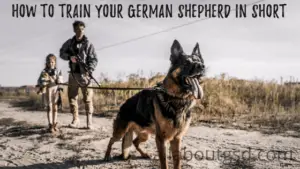
- Down-stay technique
The first and most important thing is that your German shepherd knows the stay-down command well. The dog should be aware of what tone and gesture mean down to stay. Since German shepherds are highly intelligent and loyal canines, they are pretty likely to learn it quickly. Use positive reinforcement and practice these commands in different environments.
Read more: Best dog food for German Shepherd.
- Introduction of cat
The next step is the introduction of a cat. Make sure you have read the above content, “how To Introduce a German Shepherd to a Cat?“
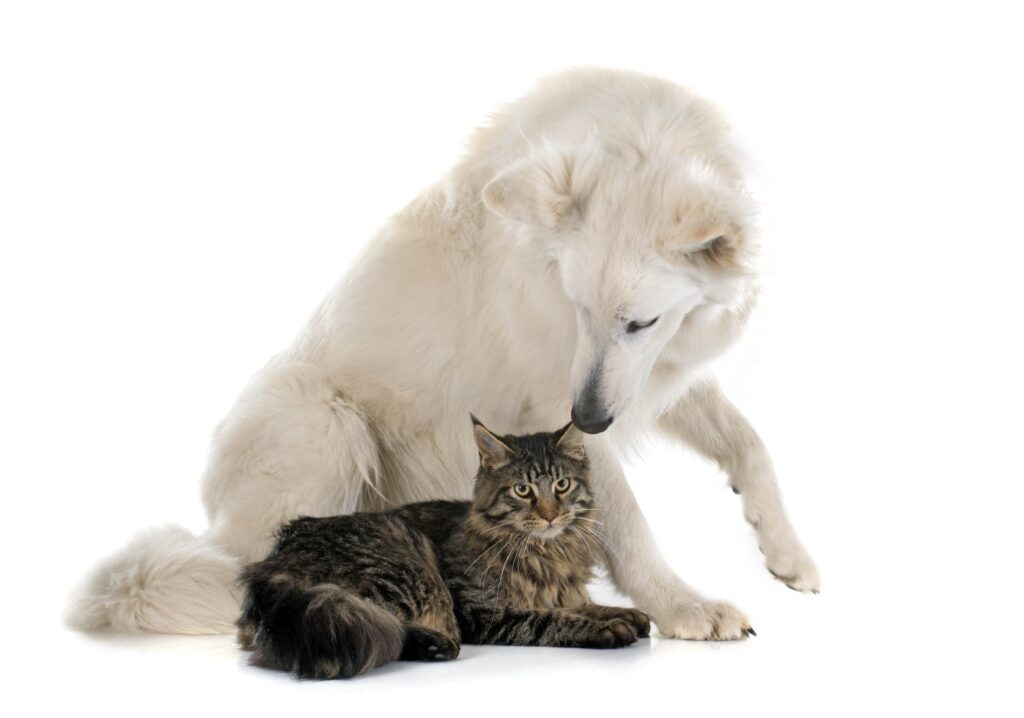
- Correct your dog’s behavior
Now the next step is to bring the dog over to the cat, preferably on a leash. If and when the German shepherd sees the cat and pounces on it, say “NO” in a loud and firm voice. Make sure the leash is intact. Reinforce the positive behavior of the German shepherd.
- Release cat
This is the last but critical stage, releasing the cat so it can approach the dog. Let the cat approach the dog at its own pace. Continue the down-stay position of the dog and be alert with the leash. Let the cat approach the German shepherd and be sniffed and be friendly with each other. Ensure the dog is lying down or in a down-stay position. If your dog maintains proper decorum and does not attack, give him a treat.
You can achieve your desired results however, this will need a lot of practice and patience on your part.
How a German Shepherd and a Kitten Became Best Friends
German Shepherd meets Cats for the first time
Frequently Asked Question
Do German Shepherd Puppies Get Along with Cats?
German Shepherd puppies are typically less aggressive than older doggies. That alone makes German Shepherd puppies easier to train and teach them how to respect and get along with cats.
In fact, it is quite rare for a German Shepherd puppy to show aggressive behavior towards other animals from a young age. However, if you fail to socialize him correctly, he may become quite aggressive as he grows up.
For this reason, it is vital that you keep teaching him how to become friends with cats and other dogs from an early age.
Proper socialization includes adequate daily interaction time between the two pets.
If you have a volunteer cat, that’s already comfortable around dogs, then the whole getting along business will be easier for your puppy, as well.
On the other hand, having a stressed-out cat will probably agitate your puppy, and you need to be more persistent and careful while teaching him to get along with your cat.
Do German Shepherds Kill Cats?
Yes, German Shepherds may kill cats. It depends entirely on the temperament of the Shepherd. The best point is you can train your Shepherd so it becomes cat friendly.
Can German Shepherds Live With Cats?
There is no clear answer to the question, “Can german shepherds live with cats?” It depends on many factors, including the temperament of dogs and cats. But, you can train them to live together if they don’t want to.
Are German Shepherds Good With Kids?
In general, German Shepherds are good with kids, thanks to their calm and family-friendly character.
Although German shepherds may be quite aggressive with strangers, they typically bond well with the members of the family, including kids of all ages.
Their intelligent nature makes those dogs easy to train, as well. Therefore, if there are kids nearby, make sure that they meet with your doggie from an early age.
However, this breed may show signs of aggressiveness if the dog is not properly socialized from a young age. Then, it is possible that he develops an anti-social, even dangerous and threatening behavior towards other creatures, including children of all ages.



